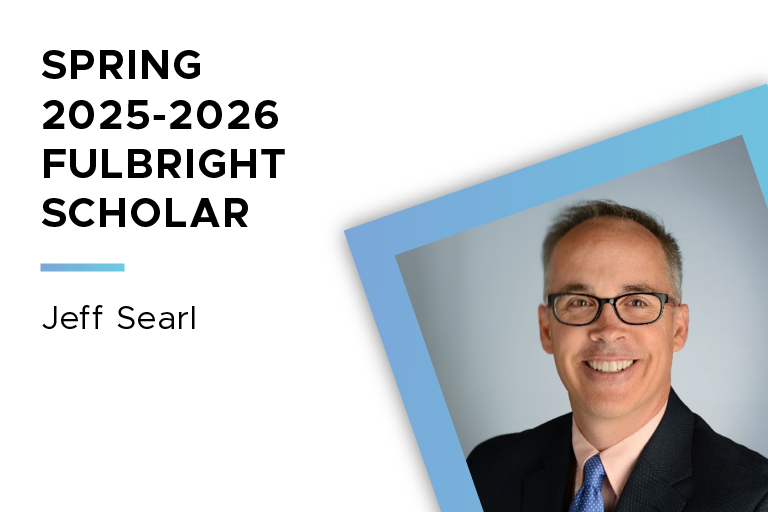Michigan State University professor Jeff Searl, Ph.D. recently returned from a three-week Fulbright-funded trip to Bulgaria, where he played a pivotal role in developing the country's first medical speech-language pathology (SLP) master's program.
The Fulbright Program is a flagship international academic exchange program that supports U.S. citizens studying, researching, teaching, or working abroad, and helps foreign students study in the U.S. It offers merit-based awards and promotes international understanding through cultural exchange.
Although funding challenges complicated this year's trip — with the U.S. freezing its Fulbright contributions just a week before the trip — the Bulgarian Fulbright Commission and the Medical University of Plovdiv stepped in to fund Searl's stay, making it one of the few U.S.-Bulgaria Fulbright placements to move forward in 2025.
Searl, a Professor and Associate Chair in Communicative Sciences and Disorders (CSD) at MSU's College of Communication Arts and Sciences, collaborated with faculty and students at the Medical University of Plovdiv to help grow emerging field of medical SLP in a country where the profession has historically focused only on early intervention and educational settings.
"This was actually my third visit to Bulgaria as part of this ongoing project," Searl said. "The real reward is working with the students who are pioneering a new professional path in their country. They're groundbreakers."
Searl's Fulbright placement was made possible through an existing partnership between MSU's CDS department and Bulgarian faculty, including Dr. Dobrinka Georgieva at the Medical University of Plovdiv. Georgieva has spearheaded efforts to introduce a graduate-level program focused on training medical SLPs to treat individuals recovering from conditions such as strokes, head injuries and neurological diseases — a type of care largely unavailable in Bulgaria until now.
"There are virtually no medical SLPs in Bulgaria," Searl said. "People with serious communication or swallowing impairments following a stroke, for example, are often told by their doctors that their families will just have to manage without therapy. That's what this program aims to change."
During his time there, Searl lectured to speech-language pathology students, participated in clinical skills exams with these students, and worked alongside local neurology, dental and pediatrics departments. He often conducted hands-on clinical demonstrations with real patients while Bulgarian medical students, residents and professionals observed.
Though his Fulbright tenure was brief, the work was part of a longer-term relationship that includes fellow MSU faculty Dimitar Deliyski, Ph.D. and Scott Yaruss, Ph.D., both of whom have ties to Bulgaria and have been involved with the project for years. Searl credits the continuity of those partnerships as a reason the work has been so effective.
"It's not just a one-time teaching gig," he said. "We're helping them build a medical speech-language pathology profession from the ground up, and that takes years of trust and collaboration."
Bulgaria's healthcare system currently lacks the infrastructure to support medical SLPs, and Searl said part of his role was to help stakeholders think strategically about adapting practices to fit the country's needs. That includes helping local leaders and graduates begin developing a professional organization modeled loosely after the American Speech-Language-Hearing Association (ASHA).
"It can't just be an American model dropped into a different system," Searl said. "We're trying to provide support while empowering them to create something that works for their context."
Searl emphasized that the Fulbright program's mission to build cultural understanding was also central to his experience. He described Plovdiv — considered one of the oldest cities in Europe — as both stunning and historic, with Roman and Ottoman ties and ancient tombs integrated into their daily life.
"You're literally walking among centuries of history," he said. "And the Bulgarian people are so proud of their culture — it was incredible to be immersed in that."
Searl said the experience expanded his global perspective and will continue to shape how he teaches and leads at MSU, particularly in preparing students to work in diverse settings.
"It's a reminder that healthcare and education don't look the same everywhere," he said. "But when we engage with humility and mutual respect, we can learn a lot from each other."
For students or faculty considering Fulbright, Searl's advice is to go beyond academics.
"Immerse yourself," he said. "The cultural exchange — getting to know the people, the place, the history — that's where the real magic of Fulbright happens."
By Claire Dippel
